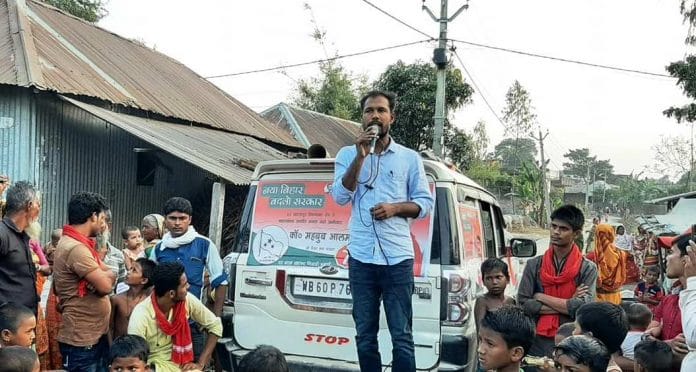As the National Democratic Alliance gets ready to form the government in Bihar, much is being discussed about Prime Minister Narendra Modi’s juggernaut. In the Bharatiya Janata Party’s big gains, it seems possible that even many migrant labourers, who suffered the worst exodus due to the Covid-induced lockdown, voted in favour of Modi. But despite the BJP’s presence, it is incredible to see that one of the biggest strike-rates on the Opposition side has been the Left alliance led by the Communist Party of India (Marxist–Leninist) Liberation.
The CPI(ML) Liberation won 12 of the 19 seats it contested, even as it has sought recount on three more seats. This success came despite months of relentless propaganda through terms such as ‘Naxalites’, ‘terrorist sympathisers’, ‘China-funded Maoists’, ‘tukde-tukde gang’ among others.
Taking the poorest of poor along
The party emerged in the 1970s after the Naxalbari movement, but immersed itself in mainstream electoral politics by the 1980s. Since then, the CPI(ML) Liberation is one of the faces of the rural poor, and changing the grammar of anti-caste politics in the region. Coincidentally, even though the party is ideologically opposed to the BJP on the Right, it shares one thing in common — both have a truly committed cadre working on the ground.
It is this cadre that has not only brought the wins in the 2020 election but also established something far more crucial in terms of future politics.
Despite Bihar’s strong political culture of social justice, the main beneficiaries have for long been Yadavs, dominant groups among OBCs (Other Backward Classes), and the Paswans among Dalits. What the CPI(ML) Liberation’s success has done is that it has turned a party that emerged out of land-based struggles for the landless castes into mainstream politics today. The party’s support to the Dalits and Musahar Mahadalits, whose families were massacred during the 1990s by the infamous Bhumihar militia of Ranveer Sena, is widely known.
When I was in Bihar last year during the 2019 Lok Sabha election campaign, it struck me how parts of rural Bihar had memorials built by the CPI(ML) to commemorate the victims killed in Bathani Tola, Laxmanpur Bathe, Shankarbigha and more.
Also read: Bihar election doesn’t reflect what is happening in India or in lives of Indians
From Mandal to current issues
The CPI(ML) Liberation has taken on hotbed issues of unemployment, agricultural bills and migrant labourers’ crisis while retaining its base among the poorest sections of Dalits. In a land of post-Mandal politics of social justice, the CPI(ML) Liberation has shifted with the times to talk about the links of privatisation to caste, land ownership and material resource-based issues as the forefront of its anti-caste politics. Not just that, in the Bihar election, it did not field a single upper-caste candidate, changing the popular notion of the Brahminical, Savarna-dominated Left leadership.
Today, the BJP seems stronger than ever before, but the farmers-related legislations have put states even like Bihar in a crisis. The popular argument is that the laws only affect the big, landed upper-caste farmers. But the protesting voices have come from Left and Dalit faces, including candidates such as MLA-elect Manoj Manzil, who campaigned against the impact of the market-driven reforms on smaller farmers. After the exodus of lakhs of migrant labourers since May, the CPI(ML) Liberation and its affiliated student organisations spent critical resources in driving aid and relief work, donations, and food-supplies for returning workers.
Most of the Bihari millennials never witnessed the Mandal politics that happened 30 years ago. And yet, for many first-time voters, the Mahagathbandhan taking on issues of unemployment, students’ protest against conducting examinations in the middle of the pandemic, workers’ crisis and farm laws prioritised the politics of caste with its intersection to jobs, labour rights and rampant privatisation.
Also read: Bihar was Tejashwi’s to lose — and lose he did
For a complete anti-caste politics
The 1990s saw important reforms for social justice, but it also saw the era of big reforms of privatisation. The Modi government today has been expanding this even more, by opening doors for privatisation of railways and introducing the agricultural laws. We need political parties that capture this imagination of caste and class together with efficient cadres on ground who take these issues to the common people, before they fall victim to Ram Mandir, offers to buy land in Jammu and Kashmir, and Pakistan-over-jobs rhetoric. The CPI(ML) Liberation’s wins prove that anxieties over these problems does in fact exist — what we need is Opposition parties that will work to overcome these anxieties on the ground for the Bahujan masses.
A few days ago, a blast at a chemical boiler factory in Gujarat killed 12 workers. The few media reports on the incident put it as a case of management’s negligence and exploitation of factory workers. Upon visiting the families of these victims, I learnt that almost all the dead were Dalit-Bahujans. The death of these 12 factory workers is also a sign of caste atrocity, but our politics still does not see the exploitation of such workers in terms of their caste identities. What political parties like the CPI(ML) Liberation have done is prove that bread and butter issues, such as jobs or ownership of land, is inherently tied to caste oppression.
For a strong anti-caste politics to succed against the BJP’s agenda, we must focus on these issues along with representation and social justice.
Jignesh Mevani is an independent MLA in the Gujarat assembly and convener of the Rashtriya Dalit Adhikar Manch. Views are personal.







People not just in India but across the world have rejected communists time and again. And this guy is dreaming of a Communist rule in India
Brahmin hater casteist propoganda wala dog barking